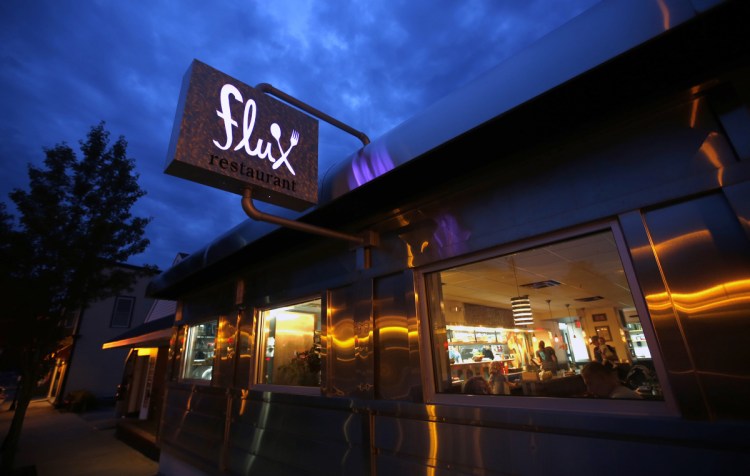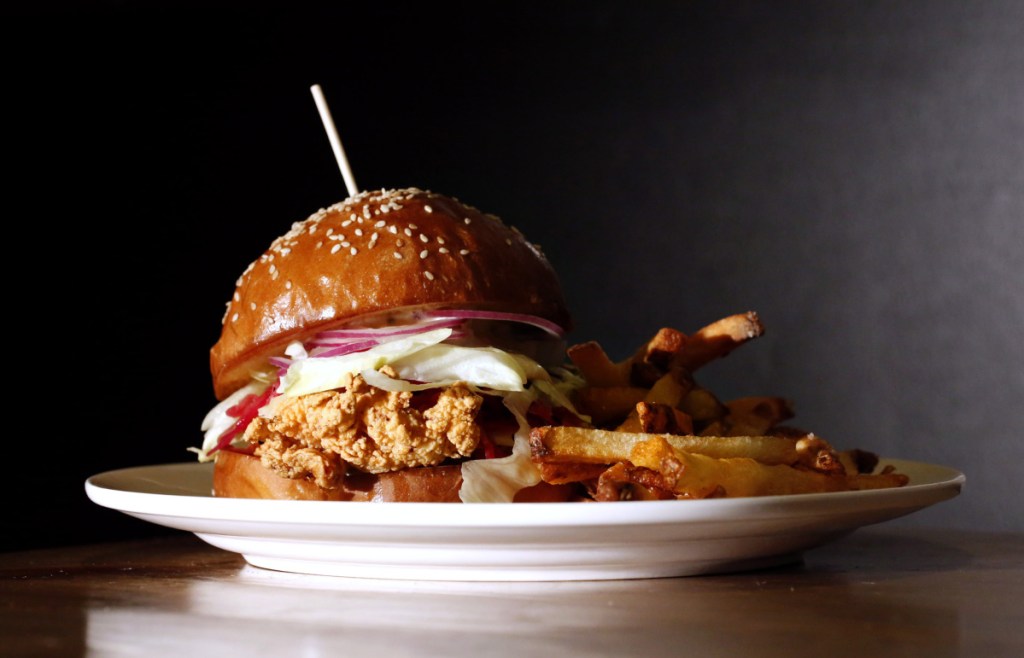“Did we pass it?” my dinner guest asks as we drive up Main Street in Lisbon Falls.
“Yes,” I reply, gesturing behind me as I parallel park. “Look across the street. We’re going to the place with the blue sign that reads, ‘Flux’.”
“I see a red sign. No blue,” he says, as we leave the car and head down the hill. As we get closer, I see what he means. Except now, it’s cyan. No, wait…yellow. And then we both start to laugh. It’s a little on the nose, but it all makes sense: There’s a color-cycling LED in the sign itself, broadcasting a signal to passersby that – in case the name didn’t tip you off – this place is all about change.
Chef/owner Jason LaVerdiere (Walter’s, Vignola), who opened Flux with his brother in a diner they gutted and renovated themselves, explains: “We’re working with at least 10 different farmers and like 20 different purveyors or more. So if we’re going to keep it mostly local, we have to adjust what we serve almost every day. You never know what produce you’re going to get or what’s going to get thrown at you. That’s what flux really means.”
It’s not only produce that necessitates frequent last-minute changes to the menu. Proteins, especially seafood, are equally unpredictable. And not everyone is sympathetic to the trade-offs involved in small-scale, local sourcing. Next to me, a man at a neighboring table grumbles loudly, “You’re kidding. This happens all the time here!” when a server tells him that the fish stew ($21) will be prepared with scallops in place of locally caught halibut tonight. I’ve already ordered a bowl and decide to stay the course with my order when the same server stops by my table to deliver the bad news.

Tempura cauliflower is tossed in a Korean chili glaze and topped with cilantro and scallions.
In the end, the substitution turns out to be an upgrade. The tomato-based, dashi-broth stew works well with supple, sweet scallops ladled alongside smoked mussels and softened strips of sweet peppers from nearby Little Ridge Farm. With a squirt of fermented shrimp-and-bean paste for depth and complexity, it’s like an Asian-esque reimagining of a classic Italian cioppino. The dish is also emblematic of LaVerdiere’s perspective on food. He cooks what he calls “modern American” cuisine, but mainly because that gives him license to ignore boundaries and restrictions. “I say that because it’s so inclusive,” he said. “It could mean anything because America is a melting pot. There’s so much diversity, and the food is coming from everywhere in the world.”
Scan the menu, and you’ll see precisely what he means. Next to tempura-style, slightly under-fried cauliflower served with a Korean-BBQ-inspired sauce of ginger, galangal and red gochujang hot sauce ($9) sits a riff on French-Canadian poutine ($10) made not with French fries, but with pommes pavés (in homage to French Laundry chef Thomas Keller): hard-seared, crispy cubes of compressed, layered potato slices that LaVerdiere blankets with a thick, house-made veal demiglace and gooey cheddar curds. Savory and unexpected, it’s one of the most original poutines I’ve tasted.
Still, Flux can feel a little loose and experimental sometimes, even down to transcontinental cocktails like an elderflower, lime and Campari-based Tequila Mockingbird ($9) that is so sweet, it prevents the floral and bitter-orange elements from stitching together on the palate.
Indeed, not all of Flux’s test balloons ascend into the heavens. Some, like the Far East salad ($6) are seismically off-kilter, with too much acid in the mint vinaigrette and a gloppy layer of rice vermicelli intended to call to mind Vietnamese bùn noodles.
Others are just slightly out of alignment. Take the Old Fashioned cake ($7), a slice of orange chiffon served with seriously boozy bourbon-soaked Rainier cherries. Tender-crumbed and light, it’s already an excellent dessert that shouldn’t be drowned in a flavor-dampening crosshatching of crème anglaise that covers the entire slice.

Server Marissa LaVerdiere carries plates through the dining room at Flux.
Or the juicy, rice-koji-brined, deep-fried “crispy” chicken sandwich ($11) that goes damp before it even hits the table. That’s due in no small part to the overly generous portion of crunchy, homemade sauerkraut. I’d eat a bowl of the shredded red cabbage, fermented for ten full days, on its own; it’s that good. But it is also too sloppy for the sandwich, especially when LaVerdiere’s extraordinary sesame-sprinkled Hokkaido milk bun suffers as a consequence, dissolving into a mushy mess next to the double-fried, house-cut fries.
Still, the cake and chicken sandwich are both nearly great – both just need a plating adjustment or two to get there. And if the server who told me, “We’ve been making a lot of little changes since we opened. Customers, especially the locals, are really not shy when it comes to telling us what they think,” was being honest, I will not have been the first person to point these problems out to the kitchen. Perhaps more importantly, it probably won’t be long before Flux makes good on its name and embraces a bit of change, even if it’s just another tweak or two.
Andrew Ross has written about food in the United Kingdom and in New York, where he co-founded NYCnosh, a food website. He and his work have been featured on Martha Stewart Living Radio and in The New York Times. Contact him at:
andrewross.maine@gmail.com
Twitter: @AndrewRossME
Send questions/comments to the editors.




Success. Please wait for the page to reload. If the page does not reload within 5 seconds, please refresh the page.
Enter your email and password to access comments.
Hi, to comment on stories you must . This profile is in addition to your subscription and website login.
Already have a commenting profile? .
Invalid username/password.
Please check your email to confirm and complete your registration.
Only subscribers are eligible to post comments. Please subscribe or login first for digital access. Here’s why.
Use the form below to reset your password. When you've submitted your account email, we will send an email with a reset code.